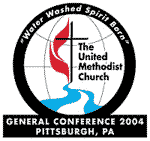United Methodist Church
General Conference 2004
Pittsburgh, April 27–May 7
"From the days of Wesley, the 'People called Methodist' have gathered to 'conference’. The early Methodists even as they attended to practical needs of the movement focused primarily on spiritual matters. Through Christian conferencing the church comes together, seeking unity in the midst of diversity, always desiring to know the mind of Christ."
These pages are dedicated to informing you about the United Methodist General Conference 2004, which was held in Pittsburgh from April 27th to May 7th. Before the conference, guest columnists wrote articles about how General Conference works, how it affects our church, and how we could participate. They highlight some of the key issues / legislation that were up for debate, and provide links to where you can find out more information.
The Senior Pastor, Rev. Deborah Fisher, who attended GC2004, summarized some of the important decisions taken at the conference in a series of pastoral columns that are listed on the right.
Introduction
The United Methodist Church is connected through conferences. At the top is the General Conference followed by the Jurisdictional Conference, the Annual Conference, the District and the Local Church Conference. The General Conference and the Jurisdictional have quadrennial sessions and this is the year they will meet. Every Annual Conference elects delegates to these. There are five Jurisdictions in the U.S. and they are: Northeastern, Southeastern, Western, North Central and the South Central. Each Jurisdiction takes a turn at hosting the General Conf. in a city with the jurisdiction. This year’s conference will be April 25 to May 7 in Pittsburgh, PA (Northeastern).
The secretary of the General Conference calculates the number of delegates each annual conference is entitled to elect. A formula is used, determined by the number of active and retired clergy in the conference and membership in the local churches. The number of laity must equal the number of clergy delegates. Our Northern Illinois Conference, in June 2003, elected 6 clergy and 6 laity to General Conference and elected 6 clergy and 6 laity to the Jurisdictional Conference, plus 2 clergy and 2 laity as alternates for Jurisdictional. The clergy vote for clergy delegates and the laity vote for laity.
When voting for the delegation, it was very important to keep in mind the diversity of the people and churches in Northern Illinois Conference.
Here are the clergy delegates:
- Dr. Myron McCoy
- Dr. Sung-Ja Lee Moon
- Rev. James Preston
- Rev. Diana Facemyer
- Rev. Luis Reyes
- Dr. Danita Anderson (our District Superintendent).
Laity delegates are:
- Roger Curless
- Harriet McCabe (Chair of NIC 2000 General Conference delegation)
- Dr. Irma Clark
- Lonnie Chaffin
- Judy Siaba
- Ana Kelsey-Powell (youth).
Clergy alternates to General Conference are:
- Rev. Debbie Fisher (DGFUMC)
- Rev. Margaret Ann Crain.
Alternates for the laity are:
- Nancy Duel
- Dr. Sondra King.
At the General Conference major decisions are made regarding the church structure, policies, the Social Principles, a four year budget and practices of the United Methodist Church.
Verla Boyle


